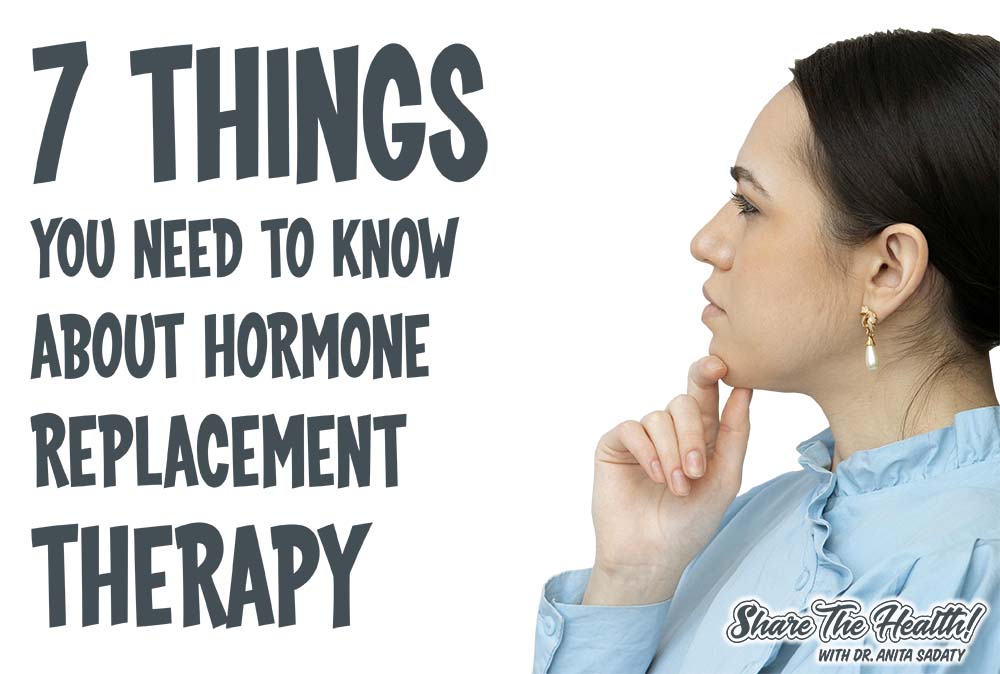
7 Things You Need To Know About Hormone Replacement Therapy
Why seven things to know? Not five or ten or some reasonable number? To be honest, I got tired and just wanted to lay down.
1. What Is Hormone Therapy?
These are prescription medications used to replace the hormones that are missing when you become menopausal. There hormones can be delivered in a variety of ways – vaginally, topically through the skin in the form of patches, gels or creams, orally in tablet or capsule form and injectable implants that slowly release hormones into the system over a period of months.
➔ There are various types of hormones available. Some are considered bio-identical (which means the hormone is the exact same structure as what your body produced prior to menopause) and others are pharmaceutically altered forms that can be patented. The main hormones that are typically replaced are estrogen and progesterone, however consideration should be given to all deficient hormones. Notice that we don’t talk about yams here. Hormones are hormones. Better and safer hormones have nothing to do with coming from root vegetables.
2. What Role Does Testosterone Play In Women?
Most of the time when people think about hormone replacement they only consider estrogen and progesterone. But leaving testosterone out of the equation is like leaving all the spices out of a recipe. You can do it, but the results are not particularly tasty. Why replace deficient testosterone levels? Assuming you avoid the chin hairs, acne or male pattern baldness — studies suggest that women may benefit from replacing testosterone to address the following symptoms:
- Low sex drive
- Lack of energy and feeling tired
- Loss of strength and muscle tone
- Vaginal dryness and painful intercourse
- Reduced ability to have an orgasm
- Irritability, depression, anxiety and mood swings
- Thinning hair
- Dry, brittle skin
- Trouble sleeping
- Reduce ability to maintain lean muscle mass
- Weight gain or difficulty losing weight
- Inability to concentrate or focus
- Fatigue
➔ The unsightly testosterone side effects I mentioned are not at all common when you are being dosed appropriately and well monitored.
3. Isn’t Hormone Replacement Dangerous?
Nope. In 2002, HRT came under attack as a result of the Women’s Health Initiative study, linking HRT to an increased risk of breast cancer. Many women abruptly stopped taking their HRT for fear of developing breast cancer. Unfortunately, the data was grossly misinterpreted and the increase in breast cancer was not statistically significant.
In addition, the majority of women in the study were many years out from menopause (average age was 63) and were not in good health (70% of them were obese, 30% were hypertensive and 50% were current or past smokers.) This hardly reflects the population most likely to use HRT (younger, less than 10 years away from menopause, and healthier.)
4. What Are The Benefits Of HRT Use?
Recent research shows that if women begin Hormone Replacement Therapy within 10 years of their last menstrual period, they have a lower risk of heart disease, bone loss, diabetes, colon cancer and weight gain. Some studies suggest that using Hormone Replacement Therapy may result in a longer lifespan compared to women NOT on HRT.
In addition, there are several symptoms that can be alleviated by using HRT:
- Hot flashes, night sweats
- Insomnia
- Vaginal dryness
- Painful intercourse
- Reduced libido
- Anxiety, depression and mood swings
- Joint and muscle pain
- Unwanted weight gain
- Dry skin, dry mouth, dry eyes
- Fatigue
- Poor memory and concentration

5. What Are The Risks Of HRT Use?
Putting aside the somewhat exaggerated concerns regarding breast cancer risk (which was NOT a statistically significant finding in the WHI study), there are concerns related to blood clotting risks. This seems to be the case for women that start Hormone Replacement Therapy more than 10 years out from their last menstrual period (when atherosclerotic disease has had time to develop) and only with higher doses of oral estrogen.
There are several side effects that should be mentioned and can mostly be addressed by modifying your HRT regimen:
- Breast tenderness
- Bloating
- Water retention
- Unintended vaginal bleeding
- Mood swings
- Headaches
- Nausea
6. Who Shouldn’t Take Hormone Replacement Therapy?
Hormone Replacement Therapy is contraindicated in women with estrogen sensitive breast and uterine cancers, existing coronary artery disease or chronic liver disease. Although there is a concern in women with a history of blood clots, use of transdermal forms of estrogen should eliminate the risk of a recurrent blood clot event. In addition, any woman with unexplained vaginal bleeding should not begin HRT without a proper evaluation for postmenopausal bleeding.
7. If You Have A History Of Breast Cancer, Does That Exclude You From Using Hormone Replacement Therapy?
This is the million dollar question. Some studies have looked at women with a history of breast cancer who took Hormone Replacement Therapy and compared them to women who did not. The data did not show an increased recurrence rate in those who took HRT.
Interestingly, the women from the WHI study who had developed breast cancer were followed out 20 years later. The researchers found that the women with breast cancer on Hormone Replacement Therapy had a lower mortality rate than women who were NOT on HRT. In fact, women who took estrogen alone had a lower rate of breast cancer compared to placebo and women on HRT.
Unfortunately the decision to take Hormone Replacement Therapy after a breast cancer diagnosis is a medicolegal issue more than it is a true medically contraindicated decision. It would be difficult for a physician to prescribe Hormone Replacement Therapy to a woman who has a history of breast cancer without the support of her treating oncologist, even though the data does NOT support the idea that using HRT increases recurrence rates.
I had the fortune of working with one breast cancer survivor who chose to start Hormone Replacement Therapy due to horrendous menopausal symptoms. Her oncologist was open minded enough to see that the patient was capable of understanding her risks and supported her decision to take HRT.
Closing Thoughts: I don’t think that the only reason to consider Hormone Replacement Therapy is to address troubling symptoms. There are many reasons why Hormone Replacement Therapy may be an appropriate option for your health. Please consider discussing this with your doctor, and by all means, do your own research to find out what is best for you!
If you’re in New York, consider scheduling an appointment with us to see if you are a candidate for treatment!
Please Share the Health if you liked what you read!!!
For more information about my wellness programs and my practice, check out my website drsadaty.com. Hey Look! You are already here…
Ready for the legal disclaimer? Information offered here is for educational purposes only and does not constitute medical advice. As with any health recommendations, please contact your doctor to be sure any changes you wish to consider are safe for you!